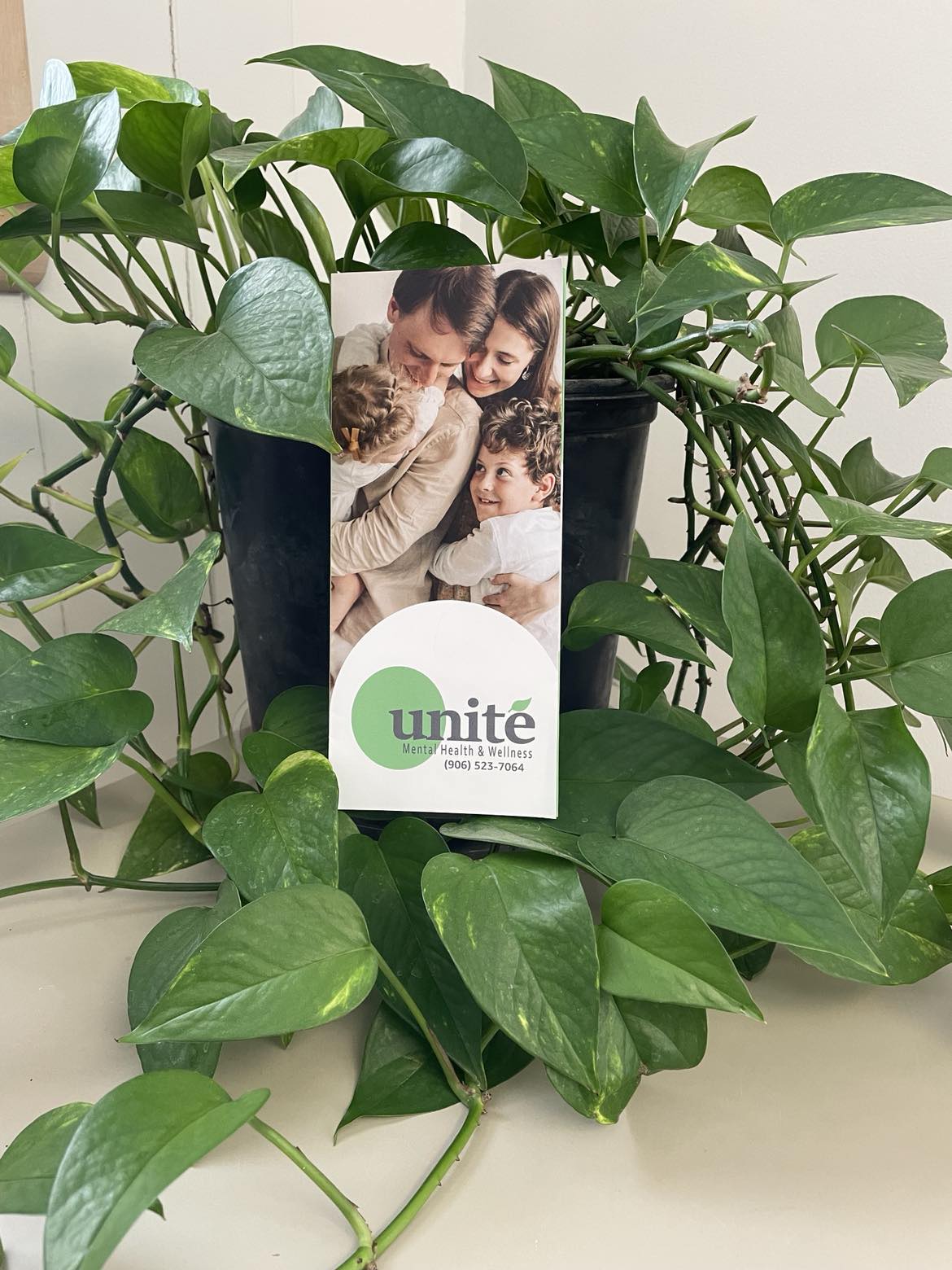Located in rural Houghton, Michigan, unitē Mental Health and Wellness is a nonprofit mental health practice offering therapy for those needing mild to moderate care. Unitē was founded by Angela Price and Beth Shannon with a mission to unite individuals in rural communities with quality mental health care while also supporting the professionals who provide it. Unitē strives to be a leader in non-crisis mental health care for rural communities.

“We are committed to helping individuals in our community connect to non-emergency mental health care services. We want to be proactive about helping individuals in hopes of mitigating the need for crisis care. Partnering with providers both locally and remotely, we aim to support professionals and services currently available in our community while filling in the gaps where care may be lacking,” says Price and Shannon.
Unitē provides both in-person and telehealth services to its patients. People can meet with their therapist in person, in private rooms at the office conveniently located on College Avenue in Houghton. Alternatively, individuals can participate in telehealth sessions with their providers remotely from the comfort of their own homes. For individuals and families whose needs unitē is unable to meet, unitē can conduct research and provide alternative solutions. “We make every effort to connect individuals with any other therapists, psychologists, or psychiatrists, local or otherwise, that we have identified on the patient's behalf,” says Price and Shannon.
In addition to focusing efforts on individual patient needs, unitē provides support and care for the mental health professionals who are providing care for the community. Unitē supports a healthy work/life balance and allows therapists to control their schedules, including what days and times they would like to work. They offer flexible working hours and support each professional within their practice. Continue reading to learn more about Angela Price and Beth Shannon’s experience with mental health care services in the rural Upper Peninsula.
Q&A
How can we improve mental health services in our region, and within the state?
It's crucial to normalize mental health treatment as a necessary component of self-care and to reduce the stigma associated with it. Reducing financial obstacles for providers and laying out a more defined path for those who wish to work in the field of mental healthcare will make it easier for individuals to enter the field. To avoid falling into silos, it is crucial to enable deeper collaborations between various groups that are all striving to improve care and access to care. This will enable increased communication and a willingness to work together.
If you could name the most important, crucial piece of improving mental health care in the U.P., what would it be?
The most crucial piece of improving mental healthcare in the U.P. is gaining access to care that is needed. Like many other rural communities, the U.P. faces significant barriers such as a shortage of providers, transportation issues, affordability, and stigma. A few misconceptions people have about mental health is that mental health care is only for individuals who “have something wrong with them” or if you see a therapist or counselor, that means something is wrong with you. Being able to break this stigma will improve mental health care and access to mental healthcare. Another misconception is that a lot of individuals believe that a referral is needed from a medical doctor to obtain mental health services. Most of the time, there is no referral needed.
What are some barriers you have experienced that negatively affect access to mental health care services in rural areas like the U.P.?
Rural communities have some of the highest need for mental healthcare but are the least likely to seek mental healthcare specialists. Rural communities also have the lowest levels of insurance coverage, and experience a huge lack of qualified mental health providers. When looking at our community specifically, we lack mental health providers, specialized mental health care, and providers who accept insurance. Individuals experience extended wait times to receive care, and the cost of care is not affordable for some. Insufficient insurance coverage, or even more so, high deductible insurance plans that require individuals to pay out-of-pocket for services, turns patients away from receiving care. Additionally, there are outdated provider lists, which prevent individuals from knowing where to go or who to see. This hinders doctors, educators, law enforcement officers, and other community members from directing individuals to the appropriate sources for assistance.
The other side of this coin is how we, meaning our healthcare system as a whole, treat our mental health providers. They are often overworked, overburdened, and overwhelmed. How can we expect them to have longevity and provide quality care if we are continually asking more of them? Burnout is high in this profession. Our goal at unitē is to create opportunities for existing
mental health providers to live their best lives while also being able to help others live theirs.
What do you feel are some steps that can be taken to improve access to mental health care in our region?
We can attract specialty mental health professionals by offering to support them in achieving their goals. Increasing people’s awareness of available community resources and how to access those resources are essential steps as well. At unitē, we have talked about developing a fund to assist those in need by reducing the cost of services for those experiencing hardships.
What is your connection to the Northern Michigan University Center for Rural Health and how does this partnership benefit your work or how may it benefit in the future?
We met Elise Bur when giving a presentation locally about our services. We connected through our shared passion for improving the health and lives of those living in rural communities in the U.P. Unitē has a vision to replicate the services we offer in the Houghton/Keweenaw area to other communities across the U.P. and we believe the NMU Center for Rural Health can help us achieve that. We hope that this partnership leads to new connections and funding opportunities which will enable us to grow and help alleviate the mental health needs of our community and communities across the U.P. We would also like to work with students who are pursuing careers in mental health.
Anything else you would like to add?
Our culture revolves around everyone living their best life. This not only includes individuals needing help but also the employees and the therapists providing care. At unitē, providers can define their careers and the portfolio of clients they want to see as either contractors or employees. The providers can decide how much or little they want to work and when they want to work. A provider can choose how long their lunch is or when and if they want breaks. The burden of the administration duties is transferred away from the provider so they can spend their time doing what they enjoy - helping others to grow. Unitē is more than a mental health practice and an organization working to connect individuals with the care they need. Unitē focuses on building the foundation and infrastructure that will streamline access to mental healthcare in our rural communities across the U.P. We want to change what mental healthcare looks like, for both the individual needing help as well as the providers. Mental health is about self-care. This is why our office provides a warm, calm, and inviting office with a lot of positive energy. Creating this welcoming place where people enjoy visiting and gathering allows us to be a central location for others to seek help and information.
If someone is looking to get in contact with you, how can they do so?
If someone is looking to get in contact with us, they can call 906-523-7064 or email info@unitewellness.org. We love connecting with others who share an interest in improving the lives/mental health of our community members. Feel free to stop by in person or visit our website (for Sarah: unitewellness.org) for more information and opportunities
The Northern Michigan University Center for Rural Health seeks to improve the health and well-being of Upper Peninsula residents and communities by developing collaborative partnerships that enhance the access and availability of affordable, quality healthcare services. For questions or comments related to this story, contact ruralhealth@nmu.edu.
